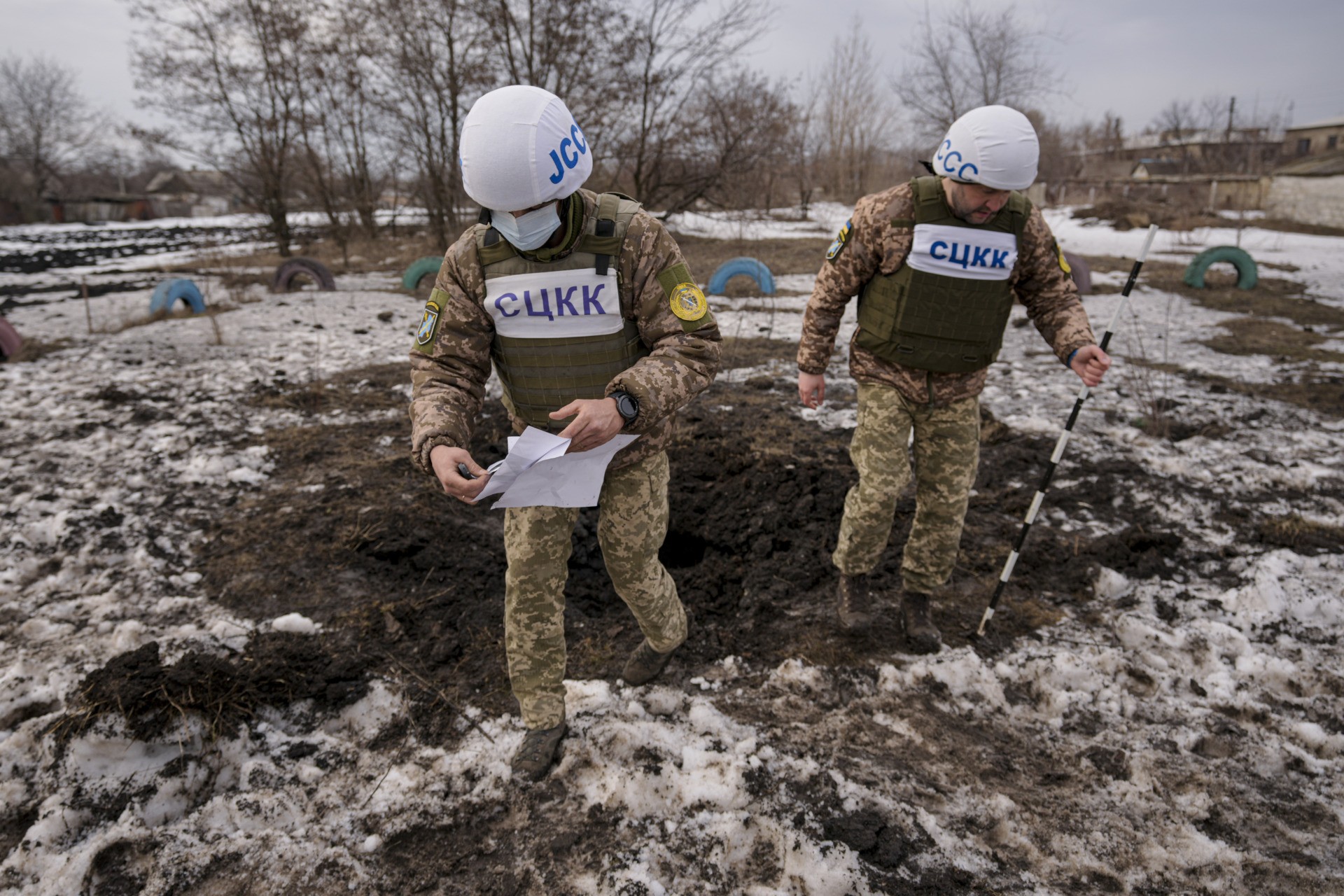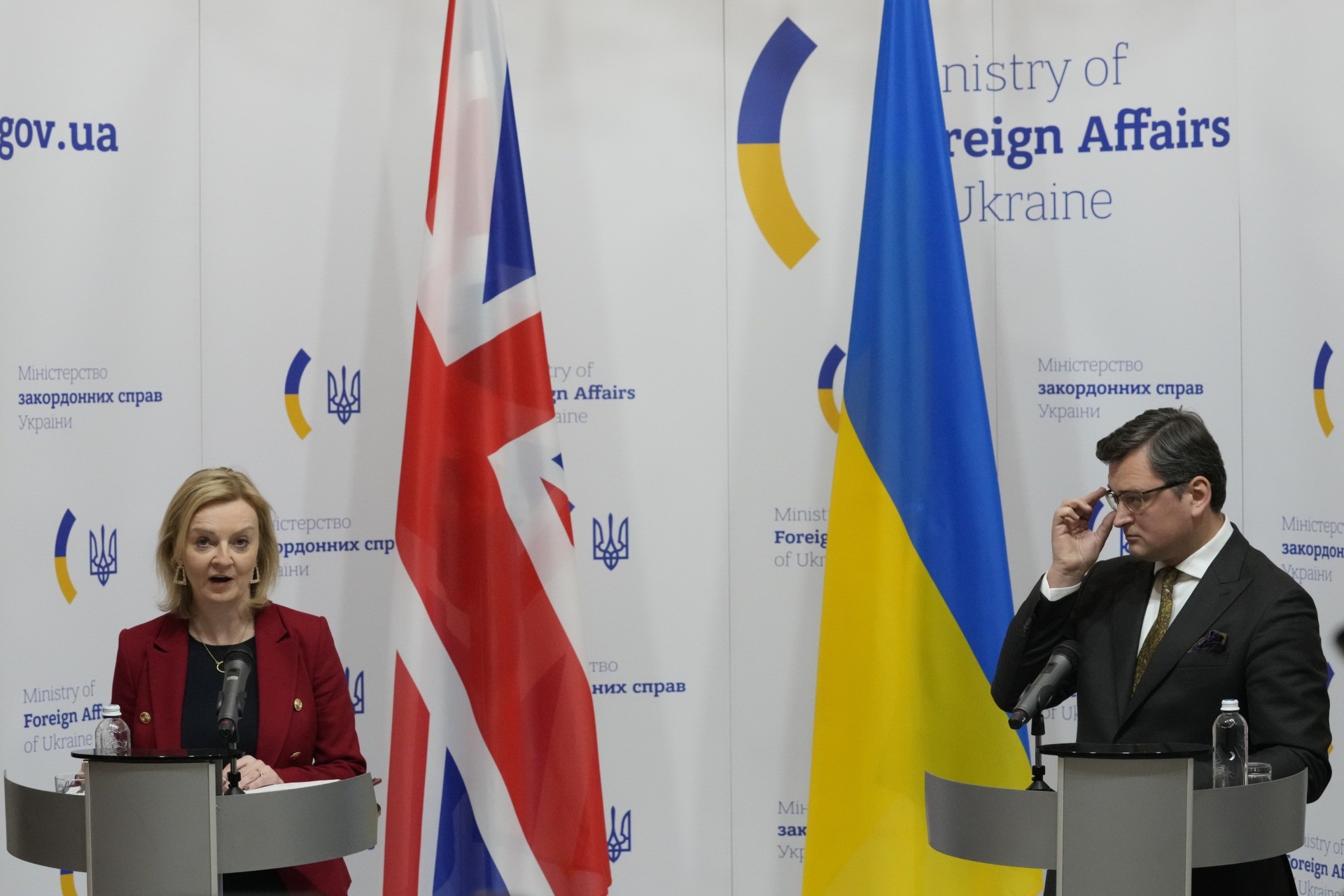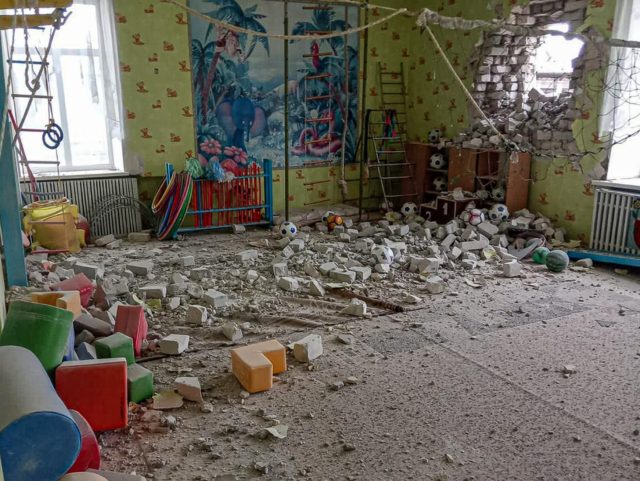The Prime Minister and several government ministers have labelled Russia’s claims surrounding shelling that struck, among other locations, a school in Ukraine a “false flag operation” intended to discredit Ukraine.
A “Kindergarten” junior school in Stanytsia Luhanska, Ukraine, was struck by shellfire that impacted several villages and towns near the Donbas region in Eastern Ukraine on Thursday morning. According to the Ukranian government, as of Thursday afternoon, there had been “42 cases of shelling” recorded which had not caused any deaths, but had seen buildings damaged and seen several people injured, including at least four civilians and one soldier.
In military parlance, “shelling” is understood to be a concentration of indirect artillery fire intended to impact a wide area, rather than directed fire attempting to destroy a particular target. Generally, it involves explosive ordinance, or shells fired in a barrage.

Solderis survey a crater from an artillery shell that landed near a school in Vrubivka in the Luhansk region, eastern Ukraine, Thursday, Feb. 17, 2022. (AP Photo/Vadim Ghirda)
The Russian government provided their own take on events, saying in a release from state media service TASS that the shelling was not by Russian forces but from “forces of the self-proclaimed Donetsk People’s Republic” — in other words forces loyal to and equipped by Moscow — and was initiated in response to Ukraine shelling them first.
Ukraine denies having shelled at all and says the weapons used by Russia in the bombardment are from heavy guns and a tank banned by the Minsk accords signed in 2014.
Responding to Russia’s claims about the circumstances surrounding the barrage — that they shelled a school in self-defence — several senior figures from the United Kingdom have explicitly called the claims a “false flag”, a term with historical connotations relating to warships in the age of sail hoisting the colours of another nation to launch a surprise attack or escape detection.
British Prime Minister Boris Johnson was among those, and spoke to television crews at a Royal Air Force base surrounded by military aircraft which, he said, were to shortly fly to Eastern Europe to surveil and gather intelligence over Belarus, Poland, and Ukraine.
Speaking in certain terms, Johnson said the government was absolutely certain Russia’s activities are a “‘false-flag’ operation designed to discredit the Ukrainians, designed to create a pretext, spurious provocation for Russian action”. Further, he said the UK expected more such events in the coming days.
British Defence Minister Ben Wallace, who has become something of a minor celebrity in European foreign policy circles in recent weeks — it is claimed — over his handling of Britain’s response to Russia, struck a similar tone to the Prime Minister on Thursday. In remarks reported by The Times, Wallace said the shelling was part of Russia’s “playbook” for invasion, and that if it were to continue, in coming days there would be “false flags” claims of genocide and breaches of ceasefire made by the Russian state made as a pretext for further action against Ukraine.
Wallace and Johnson were joined in those remarks by British Foreign Secretary Liz Truss during a joint press conference with her Ukranian counterpart, Dmytro Kuleba, in Kyiv on Thursday afternoon. Truss said: “…we have been warning about the likelihood of a false-flag operation and that is what we are seeing taking place. We are very clear, the aggressor in this situation is Russia. We will continue to call out false-flag operations, we will continue to call out cyber-attacks.”
Upon arrival in-country, Truss had written that:
Reports of alleged abnormal military activity by Ukraine in Donbas are a blatant attempt by the Russian government to fabricate pretexts for invasion.
This is straight out of the Kremlin playbook.
[The UK] will continue to call out Russia’s disinformation campaign.
Ukranian foreign minister Kuleba made considerable remarks of his own during the joint address, where as well as announcing the formalisation of a previously-revealed Trilateral pact between his nation, the United Kingdom, and Poland, he outlined the extent of the morning’s attacks.

British Foreign Secretary Liz Truss and Ukrainian Foreign Minister Dmytro Kuleba attend a joint news conference following their talks in Kyiv, Ukraine, Thursday, Feb. 17, 2022. (AP Photo/Efrem Lukatsky, Pool)
He told the assembled press that: “as you know, the enemy shelled Ukrainian territory with heavy weaponry which is prohibited by the Minsk accords, civilian infrastructure was damaged in Stanytsia Luhanska with at least two people injured…A number of other localities also came under enemy fire, as of 1500 today 42 cases of shelling have taken place.”
Accusing the Russian “propaganda machine” of distorting facts, Kuleba said the shelling took place “from the occupied territories controlled by Russia”. He thanked the United Kingdom for its assistance, saying “Ukraine and the United Kingdom have become closer than ever before… it is fair to say Ukraine has a reliable friend and ally, where actions speak louder than words”, and saying he had “full confidence” in Liz Truss.
The comments may come as some comfort for Truss — she faced negative headlines last week after she met with Russian foreign minister Sergey Lavrov, who insulted her intelligence in remarks post-discussions with the press.

COMMENTS
Please let us know if you're having issues with commenting.